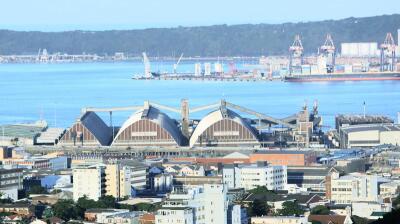The latest Durban Business Confidence Index reveals a fragile rebound in optimism among local businesses. However, ongoing service delivery issues, power shortages, and economic uncertainties continue to cast shadows on Durban’s economic outlook.
Despite a slight uptick in Durban’s Business Confidence Index, entrepreneurs and business leaders in the eThekwini Municipality remain cautious about the city’s economic prospects.
Business leaders in Durban have expressed tempered optimism about the city’s economic prospects in the latest
While the index has shown a marginal improvement, concerns about service delivery and broader economic challenges persist, painting a cautious picture for the eThekwini Municipality.
The Durban BCI is compiled by the Macroeconomics Research Unit in the University of KwaZulu-Natal’s School of Accounting, Economics and Finance from quarterly surveys of business conditions and expectations among local entrepreneurs and executives.
The latest index has inched up from 37.28 to 44.68, marking a 7.4 index point improvement compared to the previous quarter.
Although this suggests a slight recovery, it still reflects a lack of strong confidence in the Durban economy.
Notably, the report highlights that Durban’s BCI remains relatively higher than South Africa’s national business confidence index, which stood at 33 in the third quarter.
The report attributes the improved confidence, albeit weak, to the reduction in power cuts that had significantly impacted businesses’ stocks and profits.
It’s seen as a sign of recovery from the economic setbacks caused by events such as the July 2021 unrest, April 2022 floods, and persistent load shedding.
However, the report emphasises that businesspersons still lack the confidence needed for robust economic growth.
Breaking down the data across sectors, most industries in Durban reported an improvement in confidence, except for the construction sector, which saw a notable drop due to concerns related to the so-called ‘construction Mafias’.
Financial intermediation, insurance, real estate, and business services experienced a marginal increase in confidence, largely influenced by tight financial market conditions and global economic uncertainty.
Service delivery remains a sticking point for Durban businesses, with 78.4% of respondents indicating that authorities’ responsiveness to complaints about ‘poor service delivery’ remains unlikely.
Electricity was the top concern, followed by environmental management, roads, water, and public safety.
Analysing selected macroeconomic indicators, the report reveals that household consumption expenditure decreased by 0.3% in the second quarter of 2023, contributing negatively to overall growth.
Additionally, several industries, including construction, trade, electricity, and transport, experienced contractions in the same period.
Durban’s economic growth remained sluggish, and it is projected to decline further in the subsequent quarter due to load shedding and slow-paced investment, coupled with restrictive macroeconomic policies and budgetary shortfalls.
The unemployment rate in Durban increased from 19.4% in the first quarter to 20.7% in the second quarter of 2023, partly attributed to slow economic growth, rising public debt, and infrastructure challenges.
Persistent power cuts, high interest, and inflation rates, as well as currency instability, continue to undermine the city’s economy.
The report notes that the recent uptick in inflation may negate previous gains, while the South African Reserve Bank is expected to maintain a cautious approach to monetary policy due to inflation concerns.
Insufficient demand and limited access to credit have also dampened business performance.
The exchange rate of the South African rand against the US dollar showed a weakening trend throughout the third quarter, primarily due to low economic growth, investor uncertainty, and power shortages, impacting international trade and input costs.
The Durban BCI highlights the continued lack of confidence in the city’s economy, with service delivery issues, economic challenges, and power cuts acting as persistent obstacles to robust growth.
The report suggests that addressing these issues is crucial for restoring business confidence and facilitating sustainable economic recovery in Durban.
IOL News

